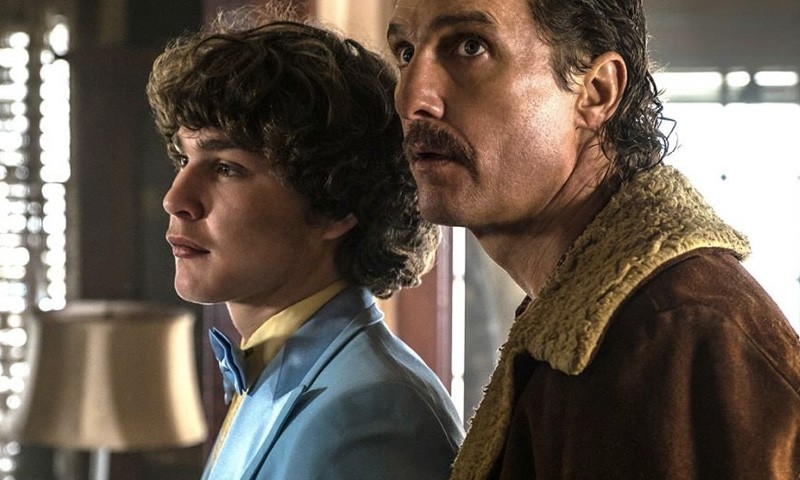White Boy Rick
White Boy Rick, 2018, 3 ½ stars
Detroit flashback
Crime drama depicts city in the addled ‘80s

Richie Merritt and Matthew McConaughey (image copyright LBI Productions / Studio 8 / Columbia Pictures)
From The Detroit Metro Times and The Orlando Weekly, September 14, 2018
Richard Wershe Jr., better known as “White Boy Rick,” had been mostly forgotten until a magazine article in 2014 reacquainted us with the strange tale of the Detroit boy who, in the mid-1980s, became a drug kingpin and FBI informant before reaching the ripe age of 16.
But Detroiters never forgot, as Wershe’s story is their story. And White Boy Rick, the new crime drama from French director Yann Demange, successfully captures the urban decay, drug scourge and gun violence that epitomized the city in the 1980s. Sharp-eyed residents of the city’s east side might spot that most of the movie was filmed in Cleveland – with only glimpses of Detroit itself – but the production design is otherwise impressive and, when combined with the pitch-perfect performances, overcomes a screenplay that is somewhat uneven, especially in its final act.
Wershe lived with his sister and “low-life” but well-intentioned father in a bedraggled house on Hampshire Street. While his dad sold illegally modified weapons, Rick palled around with drug dealers. Because almost all of them were black, Rick acquired the “white boy” moniker.
But the FBI was onto his dad’s scheme, threatening to prosecute him if he didn’t inform on his crack-peddling, murderous customers. But it was Rick who instead chose to cooperate, tempted by the payments promised him by the FBI. But instead of being a path out of poverty and violence, it was the first step down a path of tragedy.
The story is surprisingly big – too big for a teenager and too big for the screenplay. Perhaps that’s why it took three writers (Andy Weiss, Logan Miller and Noah Miller) to cobble it together. But multiple writers often lead to messy scribbling, and that is occasionally the case here, as the meandering script has a tough time transitioning from an emotionally uplifting second act to an event-packed, heartbreaking finale. Still, some of the dialogue is superb, and Demange – in just his second feature, following ’71 in 2014 – manages to draw drama and a surprising amount of comedy from moments that might have fallen flat in the hands of a less skilled helmer. Sure, it departs from the facts slightly, but that is forgivable because it captures the story’s spirit.
White Boy Rick is driven by its actors. As Rick, Richie Merritt makes an astonishing debut, capturing the emotional angst and pride of his character in hyper-realism. As his dad, Matthew McConaughey delivers another powerhouse performance that might land him a supporting-actor Oscar nomination. Their chemistry is evident in a scene in which they confront their own expectations: When his dad observes that their lives have turned out OK despite Rick’s sister’s drug abuse and a shooting leaving him seriously injured, Rick remarks, “Your daughter is a junkie, and I’m shitting into a bag.”
“I’m a glass-half-full” guy, Richie Sr. responds.
As the aforementioned sister, Bel Powley (The Diary of a Teenage Girl) exudes wide-eyed hopelessness. (Her depiction of addiction, and McConaughey’s reaction, will stick with you, though her story seems sandwiched between other plots.) As FBI agents, Jennifer Jason Leigh and Rory Cochrane are utterly believable, even if their characters are composites. Jonathan Majors (Hostiles) is scene-stealing as a gang leader, newcomer Raekwon Haynes is effective as Rick’s gang buddy, and Bruce Dern and Detroit native Piper Laurie are memorable as Rick’s grandparents, though the latter two have little to do.
No moment is more illustrative of lost innocence – both Rick’s and Detroit’s – than Rick’s attraction to an enormous, yellow, plush duck. Intended as a gift for his sister, the stuffed animal accompanies Rick along the hardscrabble streets, past the burned-out buildings. And when he finally presents it to his sister, the two are seen, if only briefly, not as gun-toting, cocaine-snorting criminals but as children denied their childhood.
“You still are a kid, Rick,” she says, before the two are drawn into yet another orgy of violence that typified the lives of too many Detroiters.
© 2018 Euclid Media / MeierMovies, LLC